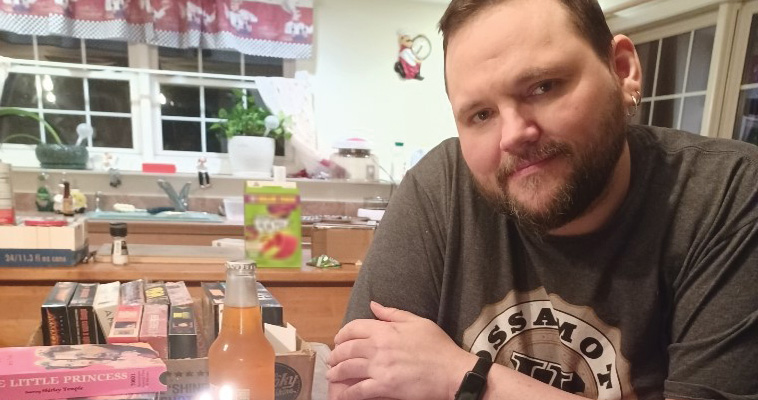
Brenton always enjoyed the simple things in life. A good book or cooking a good meal could make the hours fly by. One of his favorite things to do was road trip with friends and take in new sights. Turning off the GPS and taking the road less traveled was a priority. Brenton worked hard at his day job, putting in hours at a veterinary clinic and bettering the lives of beloved pets.
In 2019, Brenton began to experience chronic urinary tract infections (UTIs). Around the same time, he started an immunosuppressant medication to help with psoriatic arthritis. Because of this, Brenton was getting sick constantly and the UTIs were getting worse. For these reasons and other health issues, his job at the veterinary clinic became too physically demanding. Because of his hard-working nature, despite the advice from others he chose to take a less demanding job at a convenience store rather than apply for disability benefits.
Brenton’s health continued to deteriorate throughout the year. Eventually he had no choice but to stop working all together. He learned the UTIs were a result of urethral stricture disease, and only surgery would stop the chronic infections. But with no job, Brenton had no insurance. Private insurance would not cover him because of all his health conditions. He felt hopeless. Without medical intervention, the infections continued. He rapidly lost weight and become extremely malnourished. He felt weak and fatigued all the time, often collapsing at home after doing too much.
It wasn’t long before Brenton was evicted from his apartment. With no way to pay rent, a marshal came to serve the eviction notice. But when the marshal saw the condition Brenton was in, he made the wise choice to call 911. Brenton was devastated to not only lose the place he called home, but also everything he owned and worked for.
What seemed like the worst-case scenario turned into a life saving measure for Brenton. It took two weeks in the ICU to stabilize his condition. His medical team focused on helping Brenton regain some of the 100 pounds that he had lost. Protein shakes were required with every meal. They also assured him that being admitted to the hospital was the right move as he would not have made it much longer.
When Brenton was ready to leave the hospital, he was admitted to a nursing facility to continue his rehabilitation. He recalls feeling trapped and out of place with not many people to talk to, given that most other residents were decades older. The food was far from ideal, especially for someone who had a passion for cooking. He still managed to gain the weight he desperately needed, thanks to ordering take out and from friends and family bringing in his favorites.
After three years in the facility and delays due to COVID, Brenton could finally see a light at the end of the tunnel. A staff member at the facility told him about the Money Follows the Person (MFP) program, and the facility social worker helped him apply. He was also approved for disability benefits. Brenton said the MFP process wasn’t fast or easy, but it was worth it. Working with a specialized care manager, transition coordinator, and housing coordinator, he found an in-law style apartment that he could afford. Because he lost all his belongings when he was evicted, MFP also helped get him furniture and household items.
Brenton’s health is now under control. He has the Medicaid insurance he needs and is working with his doctor to do the surgery. He has a new chapter of life, explaining, “I’m as happy as I could possibly be.” Living in the community again allowed him to rescue a dog from a local shelter and spend more time with his girlfriend. His apartment is in a wooded area, so he often spends mornings on the porch watching deer, or in his hammock reading a book. After years in a facility, he has a new appreciation of his alone time, privacy, and overall freedom.
Read the CT Money Follows the Person Quarterly Report
MFP Demonstration Background
The Money Follows the Person Rebalancing Demonstration, created by Section 6071 of the Deficit Reduction Act of 2005, supports States’ efforts to “rebalance” their long-term support systems, so that individuals can choose where to live and receive services. One of the major objectives of Money Follows the Person (MFP) is “to increase the use of home and community based, rather than institutional, long-term care services.” MFP supports this by offering grantee States an enhanced Federal Medical Assistance Percentage on qualified services. MFP also offers states the flexibility to provide supplemental services, such as assistive technology and enhanced transition services, to assist in successful transitions. States are then expected to reinvest the savings over the cost of institutional services to rebalance their long-term services and supports for older adults and people with disabilities to a community-based orientation.
